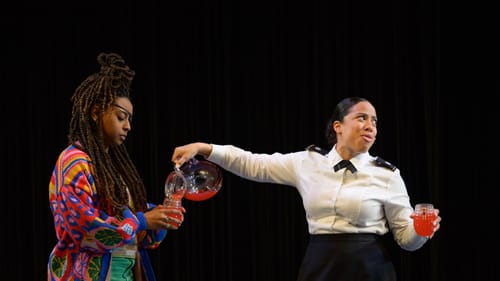Stay in the Loop
BSR publishes on a weekly schedule, with an email newsletter every Wednesday and Thursday morning. There’s no paywall, and subscribing is always free.
The reunion from hell
The Wilma Theater and Woolly Mammoth Theatre Company present Branden Jacobs-Jenkins’s The Comeuppance

It’s their party, and they’ll whine if they want to. The maladjusted Millennials who populate The Comeuppance—now onstage at the Wilma Theater, in a production shared with Washington, DC’s Woolly Mammoth Theatre Company—regularly struggle to keep their emotions in check. Although playwright Branden Jacobs-Jenkins attempts to put a personal gloss on every heavy topic under the sun, from post-traumatic stress disorder to the pandemic, the stakes of this outing feel frustratingly low, like a drunken tantrum that just won’t end.
Jacobs-Jenkins, a recent Tony winner for his play Appropriate, here uses the familiar frame of a high-school reunion to prod old wounds and air new grievances. On a chilly porch in the Maryland suburbs, five friends who haven’t seen each other in years nearly miss their festivities because they can’t stop clawing at their own throats.
The “multi-ethnic rejects” 20 years later
The group, now pushing 40, called themselves the “Multi-Ethnic Reject Group” (MERGE, for short—the meaning of the extra “E” is just one of many reasons for agita). To each person, life hasn’t shaken out as they anticipated. Ursula (Alana Raquel Bowers), whose digs they’re inhabiting, finds herself increasingly disabled by diabetes, which has caused vision loss. Emilio (Jordan Bellow), a Berlin-based artist, struggles to return to his once-familiar surroundings. Katelyn (Sarah Gliko) feels increasingly trapped in a marriage to an older, politically conservative man. Kristina (Taysha Marie Canales), a Type-A doctor, soothes her stress with too much alcohol. And her cousin Francisco (Jaime Maseda), a combat veteran, has mentally and physically brought the war home.
The party includes a sixth guest, about whom—or what, perhaps—I won’t reveal too much. Jacobs-Jenkins injects the specter of the supernatural into the proceedings, though not for the hoary purpose of cheap thrills. The rising sense that death surrounds these people in their every move comes across more as a manifestation of psychological unrest than a literal horror trope.
Frustratingly abstract
When I first saw this play last year, in a New York production directed by Eric Ting, the balance between a comedy of deeply strained friendship and the looming inevitability of mortality felt raw, poignant, and occasionally overwhelming. Despite the fantastical elements of the script, Jacobs-Jenkins has written a fundamentally realist play, and those literalistic elements are necessary to communicate the gravity of the spiritual subtext. The audience should feel like they’re sitting with this group of people on an ordinary suburban street as they wrestle with the uncomfortable reality of their lives.

That feeling never comes in Morgan Green’s frustratingly abstract production, performed on a largely barren set (by Jian Jung) with intrusive lighting and sound effects (by Minjoo Kim and Jordan McCree, respectively) that do more to cue the audience’s reactions than the acting or direction itself. From the beginning, the proceedings here seem austere and distant, and the viewer struggles to connect with the characters or their fraught, shared history. Seismic revelations pass with little more than a whimper because more often than not, you don’t care about these people or their plight.
Green’s direction privileges technical bells and whistles over intimate connection among the characters. Rarely does it feel like these five people have a long and complicated past. Among the actors, Canales comes closest to bringing dimensionality to Kristina’s crushing perfectionism; the other performance styles vary from too low-key (Bowers’s frustratingly muted Ursula) to over-the-top (Gliko’s hoydenish Katelyn).
An uncomfortable truth
The Comeuppance still retains here some of the initial power that drew me to it last year, especially at its bleak conclusion—though, by the end of this overlong production, which runs two-and-a-half hours without intermission, a fair amount of the play’s energy has dissipated. Jacobs-Jenkins taps into an uncomfortable human truth: that people cannot resist change, often for the worse, as they move closer to death. But too often here, that simple truth feels merely inconvenient rather than shattering.
What, When, Where
The Comeuppance. By Branden Jacobs-Jenkins, directed by Morgan Green. Through December 14, 2024, at the Wilma Theater, 265 S Broad Street, Philadelphia. (215) 893-9456 or wilmatheater.org.
Accessibility
The Wilma Theater is a wheelchair-accessible venue with all-gender restrooms. There will be a relaxed performance on Wednesday, November 27, at 2pm. The performance on Saturday, December 7, at 8pm will be open-captioned, and the performance on Sunday, December 8, at 2pm will be open-captioned and audio-described.
Sign up for our newsletter
All of the week's new articles, all in one place. Sign up for the free weekly BSR newsletters, and don't miss a conversation.

 Cameron Kelsall
Cameron Kelsall